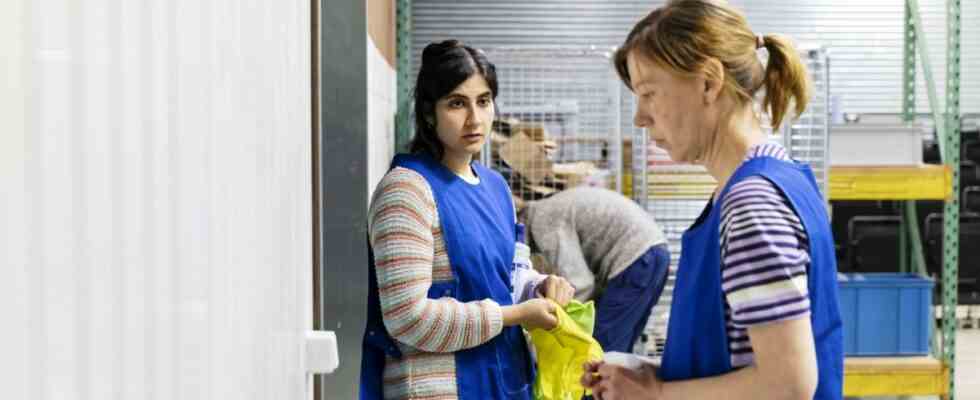Alexander Zeldin’s guest performance “Love” was the discovery of the Find Festival at the Berlin Schaubühne last year. In his semi-documentary theatre, the British author and director, despite all the laconicism, shows extremely vividly everyday life in a hostel of the broken welfare state: sorted out people. Small gestures, a hesitation or a helpless tantrum are enough to reveal entire life stories of degradation and shattered hope: it is enough to look closely. And look closely, as empathetically as unsentimentally, Zeldin can like few other directors of contemporary theater. After the hour and a half of the performance, you got to know every single person in this dorm as if you had spent half your life with them.
Now another play by Alexander Zeldin can be seen at the Berlin Schaubühne, this time in the house’s own production: “Beyond Caring”. It is Zeldin’s first directing work in Germany – and one has to hope that this director of world theater will appear more often on German stages. “Beyond Caring” is another sober, unexcited look at the less well-padded regions of society. If “Love” was about the human price of social exclusion, this time it’s about dirty work in the low-wage sector. We accompany the cleaning brigade of a slaughterhouse on their night shifts. It is his third adaptation of the play, following Zeldin’s premiere in London in 2014 and its production in Chicago. Given the scandal surrounding the Exploitation of the slaughter workers at Tönnies it looks surprisingly up to date. Apparently, the dirty side of capitalism doesn’t differ much between countries. The cleaning staff’s break room is hard to beat when it comes to drab neon light. If you have to tear off your shifts between slaughterhouse waste and wet room, you better have no illusions about meaningful work (stage and costumes: Natasha Jenkins).
Cleaners in the meat factory: So that the actors know what a layer of cleaning feels like at five in the morning, they did one themselves during the preparation.
(Photo: Gianmarco Bresadola)
Michael (Kay Bartholomäus Schulze) has been here for a good two years, a taciturn stoic who doesn’t want much more than reading his Dick Francis crime novels during the breaks in his shifts. Schulze shows the abysmal tiredness, the complete hopelessness of a decent person who knows that life doesn’t have too many nice things in store for him. Sonja (Jule Böwe), Becky (Julia Schubert) and Ava (Hêvîn Tekin) are the newcomers, initially rented out for two weeks by their temporary employment agency or assigned to a minimum-wage job by the employment agency. There might be a permanent position later, but until then they have to be on call at all times, as if they were the company’s serfs for a few poorly paid night shifts. Jule Böwe gives her Sonja the helplessness of a kicked creature, who submissively thanks the foreman Jan (Damir Avdic) for the instruction sheet with a shy smile. During the break, she comforts herself with the same deep sigh (“It’s nice when you’re on a break”) and devours her biscuits with a thirst for sweets, as if this were her salvation from the endless layers of plaster.
“What could you do to make time pressure more enjoyable?”
The tomboyish blonde Becky has more proletarian self-confidence, but maybe only the illusion that this “shithole” is not the end of her work biography. When she follows the foreman’s jokes, he promptly cancels the Saturday she had desperately asked for so that she could have some time for her daughter. Ava is the youngest, a newcomer to the job market whose shy, warm-hearted friendliness is about to drive her out. Foreman Jan likes to be the mini-dictator of his brigade. Like a caricature, he copies management fads of personnel management when he asks his people about their motivation: “What could you do to make time pressure more fun?”
Zeldin’s theater shows a hopeless situation in endless loops. It doesn’t have any major plot development or dramatic escalations, although Ava has a breakdown on a double shift and Becky vents her self-loathing and desperate pressure by rudely and aggressively pushing Michael into a short, hard sex act. This view of the sadness lives from the unsentimental sympathy for the characters and the accuracy of the milieu knowledge: Zeldin knows what he is talking about. To understand what working life is like at the bottom, he and the actors had long conversations with cleaning workers. So that the actors know what a layer of plaster feels like in the factory, they put it on themselves, starting at five in the morning. As a result, the performance of the cleaning brigade gives what the working world often enough takes away from the so-called unqualified: dignity.

